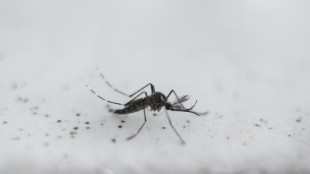
-
 Team Trump assails Biden decision on missiles for Ukraine
Team Trump assails Biden decision on missiles for Ukraine
-
Hong Kong court jails 45 democracy campaigners on subversion charges

-
 Urban mosquito sparks malaria surge in East Africa
Urban mosquito sparks malaria surge in East Africa
-
Djibouti experiments with GM mosquito against malaria

-
 Pulisic at the double as USA cruise past Jamaica
Pulisic at the double as USA cruise past Jamaica
-
Many children injured after car crashes at central China school: state media

-
 Asian markets rally after US bounce as Nvidia comes into focus
Asian markets rally after US bounce as Nvidia comes into focus
-
Tens of thousands march in New Zealand Maori rights protest

-
 Five takeaways from the G20 summit in Rio
Five takeaways from the G20 summit in Rio
-
China, Russia ministers discuss Korea tensions at G20: state media

-
 Kohli form, opening woes dog India ahead of Australia Test series
Kohli form, opening woes dog India ahead of Australia Test series
-
Parts of Great Barrier Reef suffer highest coral mortality on record

-
 Defiant Lebanese harvest olives in the shadow of war
Defiant Lebanese harvest olives in the shadow of war
-
Russian delegations visit Pyongyang as Ukraine war deepens ties

-
 S.Africa offers a lesson on how not to shut down a coal plant
S.Africa offers a lesson on how not to shut down a coal plant
-
Japan, UK to hold regular economic security talks

-
 Can the Trump-Musk 'bromance' last?
Can the Trump-Musk 'bromance' last?
-
US to call for Google to sell Chrome browser: report

-
 Macron hails 'good' US decision on Ukraine missiles
Macron hails 'good' US decision on Ukraine missiles
-
Italy eliminate Swiatek's Poland to reach BJK Cup final

-
 Trump expected to attend next Starship rocket launch: reports
Trump expected to attend next Starship rocket launch: reports
-
Gvardiol steals in to ensure Croatia reach Nations League quarter-finals

-
 Thousands march to New Zealand's parliament in Maori rights protest
Thousands march to New Zealand's parliament in Maori rights protest
-
China's Xi urges G20 to help 'cool' Ukraine crisis

-
 Church and state clash over entry fee for Paris's Notre Dame
Church and state clash over entry fee for Paris's Notre Dame
-
Holders Spain strike late to beat Switzerland in Nations League

-
 Swiatek saves Poland against Italy in BJK Cup semi, forces doubles decider
Swiatek saves Poland against Italy in BJK Cup semi, forces doubles decider
-
Biden in 'historic' pledge for poor nations ahead of Trump return

-
 Sudan, Benin qualify, heartbreak for Rwanda after shocking Nigeria
Sudan, Benin qualify, heartbreak for Rwanda after shocking Nigeria
-
Five dead in new Israeli strike on Beirut's centre

-
 Where's Joe? G20 leaders have group photo without Biden
Where's Joe? G20 leaders have group photo without Biden
-
US permission to fire missiles on Russia no game-changer: experts

-
 Tropical storm Sara kills four in Honduras and Nicaragua
Tropical storm Sara kills four in Honduras and Nicaragua
-
Germany, Finland warn of 'hybrid warfare' after sea cable cut

-
 Spanish resort to ban new holiday flats in 43 neighbourhoods
Spanish resort to ban new holiday flats in 43 neighbourhoods
-
Hong Kong to sentence dozens of democracy campaigners

-
 Russian extradited to US from SKorea to face ransomware charges
Russian extradited to US from SKorea to face ransomware charges
-
G20 wrestles with wars, 'turbulence' in run-up to Trump

-
 Kane hoping to extend England career beyond 2026 World Cup
Kane hoping to extend England career beyond 2026 World Cup
-
Gazans rebuild homes from rubble in preparation for winter

-
 'Vague' net zero rules threaten climate targets, scientists warn
'Vague' net zero rules threaten climate targets, scientists warn
-
'Agriculture is dying': French farmers protest EU-Mercosur deal

-
 Beyonce to headline halftime during NFL Christmas game
Beyonce to headline halftime during NFL Christmas game
-
Rescuers struggle to reach dozens missing after north Gaza strike

-
 Russia vetoes Sudan ceasefire resolution at UN
Russia vetoes Sudan ceasefire resolution at UN
-
G20 host Brazil launches alliance to end 'scourge' of hunger

-
 Trump confirms plan to use military for mass deportation
Trump confirms plan to use military for mass deportation
-
Schools closed in Beirut after deadly Israeli air raid

-
 Anger, pain in Turkey as 'newborn deaths gang' trial opens
Anger, pain in Turkey as 'newborn deaths gang' trial opens
-
UN climate chief at deadlocked COP29: 'Cut the theatrics'


Parts of Great Barrier Reef suffer highest coral mortality on record
Parts of the Great Barrer Reef have suffered the highest coral mortality on record, Australian research showed Tuesday, with scientists fearing the rest of it has suffered a similar fate.
The Australian Institute of Marine Science said surveys of 12 reefs found up to 72 percent coral mortality, thanks to a summer of mass bleaching, two cyclones, and flooding.
In one northern section of the reef, about a third of hard coral had died, the "largest annual decline" in 39 years of government monitoring, the agency said.
Often dubbed the world's largest living structure, the Great Barrier Reef is a 2,300 kilometre (1,400-mile) expanse of tropical corals that house a stunning array of biodiversity.
But repeated mass bleaching events have threatened to rob the tourist drawcard of its wonder, turning banks of once-vibrant corals into a sickly shade of white.
Bleaching occurs when water temperatures rise and the coral expels microscopic algae, known as zooxanthellae, to survive.
If high temperatures persist, the coral can eventually turn white and die.
This year had already been confirmed as the fifth mass bleaching on the reef in the past eight years.
But this latest survey also found a rapid growing type of coral -- known as acropora -- had suffered the highest rate of death.
This coral is quick to grow, but one of the first to bleach.
- 'Worst fears' -
Lead researcher Mike Emslie told public broadcaster ABC the past summer was "one of the most severe events" across the Great Barrier Reef, with heat stress levels surpassing previous events.
"These are serious impacts. These are serious losses," he said.
WWF-Australia's head of oceans Richard Leck said the initial surveys confirmed his "worst fears".
"The Great Barrier Reef can bounce back but there are limits to its resilience," he said.
"It can't get repeatedly hammered like this. We are fast approaching a tipping point."
Leck added the area surveyed was "relatively small" and feared that when the full report was released next year "similar levels of mortality" would be observed.
He said that it reinforced Australia's need to commit to stronger emission reduction targets of at least 90 percent below 2005 levels by 2035 and move away from fossil fuels.
The country is one of the world's largest gas and coal exporters and has only recently set targets to become carbon neutral.
L.Carrico--PC

